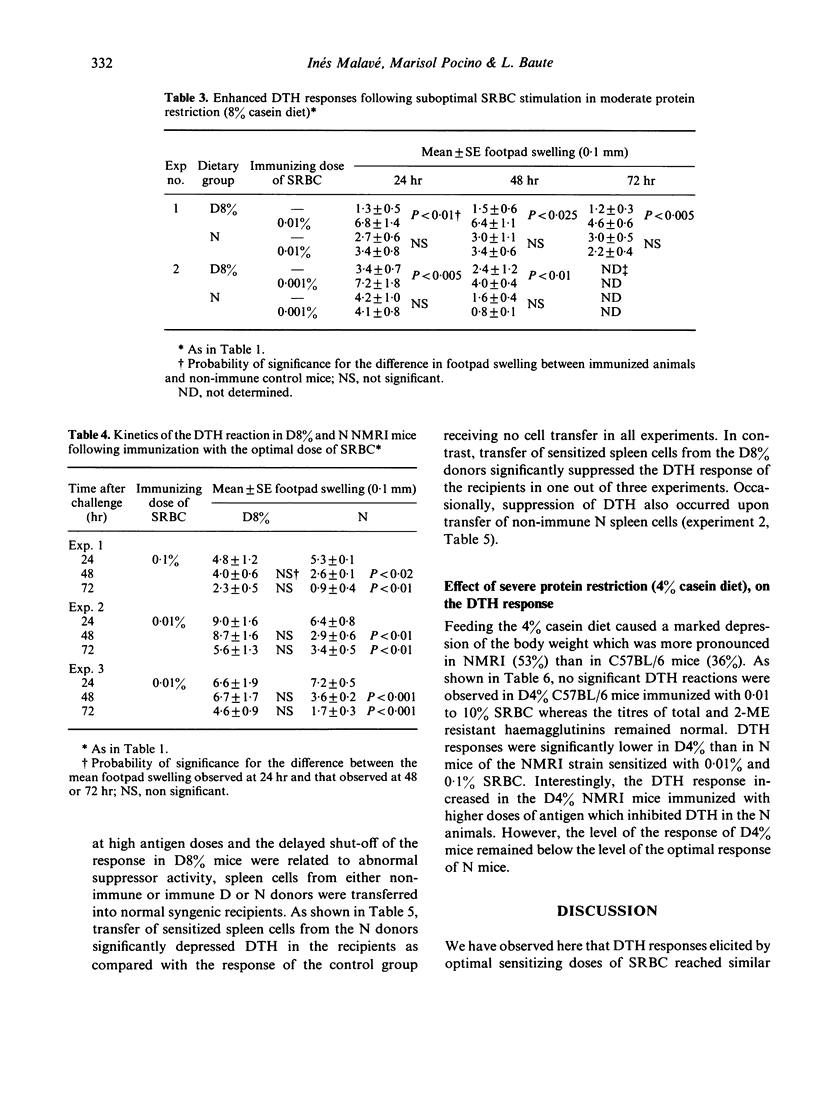Abstract
Delayed-type hypersensitivity responses to sheep erythrocytes were studied in inbred C57BL/6 and outbred NMRI mice fed either protein-deficient diets containing 8% and 4% casein or a normal diet with 27% casein. Following sensitization with optimal doses of antigen, the magnitude of the response was similar in mice fed the 8% protein and the normal diet. Large numbers of sheep red blood cells which suppressed the delayed hypersensitivity response in normal mice, failed to inhibit this response in animals fed the 8% casein diet. However, the titres of serum haemagglutinins were similar in mice of either dietary group immunized with high doses of antigen. Sensitized spleen cells from deficient mice kept on the 8% casein diet, had lower suppressor capacity than those from normal mice upon transfer into syngeneic hosts. Delayed-type hypersensitivity was significantly depressed in mice fed the 4% protein diet whereas the titres of serum antibodies to sheep erythrocytes were not diminished.
Full text
PDF







Selected References
These references are in PubMed. This may not be the complete list of references from this article.
- Askenase P. W., Hayden B. J., Gershon R. K. Augmentation of delayed-type hypersensitivity by doses of cyclophosphamide which do not affect antibody responses. J Exp Med. 1975 Mar 1;141(3):697–702. doi: 10.1084/jem.141.3.697. [DOI] [PMC free article] [PubMed] [Google Scholar]
- Bell R. G., Hazell L. A. Influence of dietary protein restriction on immune competence. I. Effect on the capacity of cells from various lymphoid organs to induce graft-vs.-host reactions. J Exp Med. 1975 Jan 1;141(1):127–137. doi: 10.1084/jem.141.1.127. [DOI] [PMC free article] [PubMed] [Google Scholar]
- Bell R. G., Hazell L. A., Price P. Influence of dietary protein restriction on immune competence. II. Effect on lymphoid tissue. Clin Exp Immunol. 1976 Nov;26(2):314–326. [PMC free article] [PubMed] [Google Scholar]
- Bongiorni-Malavé I., Pocino M. Abnormal regulatory control of the antibody response to heterologous erythrocytes in protein-calorie malnourished mice. Clin Immunol Immunopathol. 1980 May;16(1):19–29. doi: 10.1016/0090-1229(80)90162-2. [DOI] [PubMed] [Google Scholar]
- Cooper W. C., Good R. A., Mariani T. Effects of protein insufficiency on immune responsiveness. Am J Clin Nutr. 1974 Jun;27(6):647–664. doi: 10.1093/ajcn/27.6.647. [DOI] [PubMed] [Google Scholar]
- Kettman J. Delayed hypersensitivity: is the same population of thymus-derived cells responsible for cellular immunity reactions and the carrier effect? Immunol Commun. 1972;1(3):289–299. doi: 10.3109/08820137209022942. [DOI] [PubMed] [Google Scholar]
- Kramer T. R., Good R. A. Increased in vitro cell-mediated immunity in protein-malnourished guinea pigs. Clin Immunol Immunopathol. 1978 Oct;11(2):212–228. doi: 10.1016/0090-1229(78)90045-4. [DOI] [PubMed] [Google Scholar]
- Lagrange P. H., Mackaness G. B., Miller T. E. Influence of dose and route of antigen injection on the immunological induction of T cells. J Exp Med. 1974 Mar 1;139(3):528–542. doi: 10.1084/jem.139.3.528. [DOI] [PMC free article] [PubMed] [Google Scholar]
- Lagrange P. H., Mackaness G. B., Miller T. E. Potentiation of T-cell-mediated immunity by selective suppression of antibody formation with cyclophosphamide. J Exp Med. 1974 Jun 1;139(6):1529–1539. doi: 10.1084/jem.139.6.1529. [DOI] [PMC free article] [PubMed] [Google Scholar]
- Liew F. Y. Regulation of delayed-type hypersensitivity. I. T suppressor cells for delayed-type hypersensitivity to sheep erythrocytes in mice. Eur J Immunol. 1977 Oct;7(10):714–718. doi: 10.1002/eji.1830071013. [DOI] [PubMed] [Google Scholar]
- Malavé I., Layrisse M. Immune response in malnutrition. Differential effect of dietary protein restriction on the IgM and IgG response to alloantigens. Cell Immunol. 1976 Feb;21(2):337–343. doi: 10.1016/0008-8749(76)90061-7. [DOI] [PubMed] [Google Scholar]
- Malavé I., Németh A., Blanca I. Immune response in malnutrition. Effect of protein deficiency on the DNA synthetic response to alloantigens. Int Arch Allergy Appl Immunol. 1978;56(2):128–135. doi: 10.1159/000232015. [DOI] [PubMed] [Google Scholar]
- Malavé I., Németh A., Pocino M. Changes in lymphocyte populations in protein--calorie-deficient mice. Cell Immunol. 1980 Feb;49(2):235–249. doi: 10.1016/0008-8749(80)90026-x. [DOI] [PubMed] [Google Scholar]
- Miller T. E., Mackaness G. B., Lagrange P. H. Immunopotentiation with BCG. II. Modulation of the response to sheep red blood cells. J Natl Cancer Inst. 1973 Nov;51(5):1669–1676. doi: 10.1093/jnci/51.5.1669. [DOI] [PubMed] [Google Scholar]
- Mitsuoka A., Morikawa S., Baba M., Harada T. Cyclophosphamide eliminates suppressor T cells in age-associated central regulation of delayed hypersensitivity in mice. J Exp Med. 1979 May 1;149(5):1018–1028. doi: 10.1084/jem.149.5.1018. [DOI] [PMC free article] [PubMed] [Google Scholar]
- Morikawa S., Baba M., Harada T., Mitsuoka A. Studies on delayed hypersensitivity in mice. III. Evidence for suppressive regulatory T1-cell population in delayed hypersensitivity. J Exp Med. 1977 Feb 1;145(2):237–248. doi: 10.1084/jem.145.2.237. [DOI] [PMC free article] [PubMed] [Google Scholar]
- Nelson D. S., Mildenhall P. Studies on cytophilic antibodies. 1. The production by mice of macrophage cytophilic antibodies to sheep erythrocytes: relationship to the production of other antibodies and the development of delayed-type hypersensitivity. Aust J Exp Biol Med Sci. 1967 Apr;45(2):113–130. [PubMed] [Google Scholar]
- Pocino M., Malavé I. Enhancement of the in vitro antibody response in dietary protein restriction. Failure in the regulation of antibody synthesis. Immunology. 1981 Jun;43(2):235–240. [PMC free article] [PubMed] [Google Scholar]
- Ramshaw I. A., Bretscher P. A., Parish C. R. Regulation of the immune response. I. Suppression of delayed-type hypersensitivity by T cells from mice expressing humoral immunity. Eur J Immunol. 1976 Oct;6(10):674–679. doi: 10.1002/eji.1830061003. [DOI] [PubMed] [Google Scholar]
- Schwartz A., Askenase P. W., Gershon R. K. Regulation of delayed-type hypersensitivity reactions by cyclophosphamide-sensitive T cells. J Immunol. 1978 Oct;121(4):1573–1577. [PubMed] [Google Scholar]
- Sy M. S., Miller S. D., Claman H. N. Immune suppression with supraoptimal doses of antigen in contact sensitivity. I. Demonstration of suppressor cells and their sensitivity to cyclophosphamide. J Immunol. 1977 Jul;119(1):240–244. [PubMed] [Google Scholar]
- Turk J. L., Parker D., Poulter L. W. Functional aspects of the selective depletion of lymphoid tissue by cyclophosphamide. Immunology. 1972 Oct;23(4):493–501. [PMC free article] [PubMed] [Google Scholar]
- Yoshikai Y., Miake S., Matsumoto T., Nomoto K., Takeya K. Effect of stimulation and blockade of mononuclear phagocyte system on the delayed footpad reaction to SRBC in mice. Immunology. 1979 Nov;38(3):577–583. [PMC free article] [PubMed] [Google Scholar]


